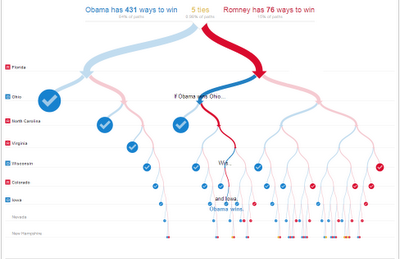Graph(s) of the week: US electoral predictions and results
Diverting from economics for a brief movement, and switching to politics.
Prediction
This is my prediction from yesterday on the outcomes in swing states (click to enlarge):
Well, it seems I was a bit off, apart from the overall result: (click to enlarge)
Note: This was a two day post, the first part covering predictions, the second part covering the results.
Prediction
During today's (yesterday's) election day the New York Times had an interesting interactive feature in the form of a game theoretical "tree" where different outcomes were paired together based on the electoral result in 9 swing states.
This is my prediction from yesterday on the outcomes in swing states (click to enlarge):
 |
| Source: NY Times, 512 Paths to the White House |
As you can notice, my prediction is an overall Obama victory in a scenario in which he looses Florida, North Carolina, Virginia and Colorado to Romney, but retains victories in Ohio, Wisconsin and Iowa. I would have given both Nevada and New Hampshire to Obama as well (despite Romney's summer house being located in the former state). However the last two states wouldn't make any difference since the paring was made based on the relative significance of the swing states.
The mechanism is very simple; you look at which candidate wins states based on their importance and size of electoral college votes. The first in line is a choice between who wins Florida. I put Romney. Then you go down the first big red line and pick a winner for Ohio (no backward induction this time I'm afraid). For Ohio I chose Obama. I gave the following two states to Romney to spice things up a bit (and to keep my line going). However, I ended up giving Wisconsin to Obama, moving me to a different equilibrium point. And so on, until you reach the optimal, predicted strategy. (ok, it's not really game theory, but it's kinda close)
I based my predictions on the latest polls from those states from Real Clear Politics (they have a decent aggregation of most recent polls), the Economist, NY Times, and my own hunches. There was also this web page, called Intrade, which was taking bets from investors on who wins the elections, and is very often a more precise estimator of the likely winner than electoral polls, simply because in here people actually put their own money at stake. I generally feel that expectations on who will be the likely winner reveal much more than the polls themselves. For example, during the Republican primary, Romney was trailing behind Perry, Cain, Gingrich and Santorum at several points during his campaign, but at every point in that time he was considered as the most electable and the most probable candidate. The same thing is with the race for President, where even though Romney was in the popular lead a few times, Obama always seemed as the most probable victor. This has interesting implications on behavioral political economy, and how expectations of certain outcomes can reversely affect the outcome itself.
Results
Results
Well, it seems I was a bit off, apart from the overall result: (click to enlarge)
 |
| Source: NY Times |
It took Obama to win only the first two states on the "swing state tree", Florida and Ohio, to secure his victory. So that graphic from above is simplified to the first equilibrium point, where Obama retains Florida and Ohio and wins, regardless of the result in other swing states.
Overall there was much less uncertainty regarding the electoral college vote. The popular vote was close, in the swing states as well, but that was hardly a surprise. The swing states weren't that "swing" after all, as they all, except North Carolina, ended up supporting Obama. In that perspective my predictions were right for all swing states except for Florida, Virginia and Colorado (the ones I though Romney would win).
To sum up, not much has changed in America: same President, same Senate control (Dems), same House control (Reps). So far this combination wasn't particularly good for the recovery (recall the fiscal cliff debate in August last year, in addition to many further quarrels down the road). I hope things do turn out better for the US in the end, although it's hard to see how any of the two current political options would make that happen, in both the short and the long run.




Comments
Post a Comment